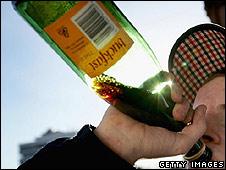Commission's recommendations could lead to Buckfast ban
- Published

Buckfast is a popular tonic wine in parts of Scotland
Scottish Labour wants a legal limit on the caffeine content of alcoholic drinks which would effectively ban the tonic wine Buckfast.
The party hopes to amend the forthcoming alcohol bill to stop drinks firms using more than 150 milligrammes of caffeine per litre of alcohol.
Buckfast currently contains two-and-a-half times that amount.
Labour MSP Jackie Baillie said the limit would help to curb the problem's caused by "wired, wide-awake drunks".
The party set up an Alcohol Commission which made the recommendation on limiting caffeine in its interim report.
It also said that the ban of selling alcohol to under 18s in Scotland should be better enforced.
Debate due
Based on the report, Labour is planning a number of amendments to the government's alcohol bill.
A debate on its details is due to be had at Holyrood next month.
She said Labour wanted to see a legal limit on the level of caffeine in alcoholic drinks of 150mg per litre which would mean that any pre-mixed alcoholic drink containing a higher level of caffeine could not be legally sold in Scotland.
Ms Baillie said that Labour would also bring forward further amendments to introduce a mandatory "Challenge 25" scheme to stop underage drinking and establish pilot schemes for alcohol treatment and testing orders to tackle the problem drinking of offenders.
She added: "I believe that tackling Scotland's hard drinking culture is a national priority.
"We need to consider radical measures to reduce the level of problem drinking. That's why Labour established the Alcohol Commission and I am grateful to its members for taking their task so seriously.
"What we are getting today is only the interim report, but we will use it to inform our response to the legislation currently going through the Scottish Parliament and bring forward amendments.
"In particular, we will act on the report's recommendations for strong action to limit the availability of alcoholic drinks with active ingredients by seeking to impose a legal limit on the level of caffeine in alcoholic drinks.
"If the SNP are serious about tackling Scotland's hard drinking culture then they should stop obsessing about minimum pricing, recognise the seriousness of this report and support our amendments."
The commission's chairman, Professor Sally Brown, said her team had consulted widely, but she added that there was still a great deal of work to be done.
'Sensible' amendments
Health Secretary Nicola Sturgeon said the report failed to acknowledge the "substantial changes" already made to Scotland's licensing laws or address the issue of minimum pricing.
Buckfast only represents 0.5% of Scottish alcohol sales, she said.
"It's clear that banning - or to be more exact reducing the caffeine content, not the alcohol content - would do nothing to reduce either alcohol misuse or the health harm it causes," she added.
Ms Sturgeon said the government would be happy to consider any "sensible, evidence-based amendments" to the alcohol bill.
Jeremy Beadles, chief executive of the Wine and Spirit Trade Association, said the commission's approach was more encouraging approach than the Scottish government's "relentless pursuit" of minimum pricing.
"While we don't believe it is constructive to focus attention on individual products, we do support the commission's ambition to pursue an overall agenda of cultural change, and we are keen to continue to work with the commission in developing their final proposals," he added.